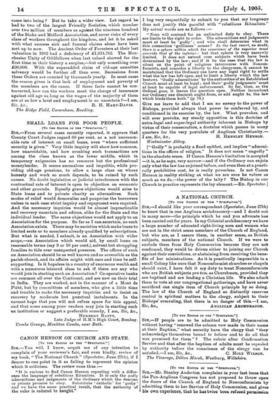CANON HENSON ON CHURCH AND STATE.
[To THE EDITOR or THE " SPECTATOR."]
Sin,—You will, I know, acquit me of any intention to complain of your reviewer's fair, and even kindly, review of my book, "The National Church" (Spectator, June 27th), if I demur to one point in it as failing to represent the opinion which it criticises. The review runs thus :—
"It is curious to find Canon Henson repeating with a differ- enee the language of rebellious Ritualists. It is only the godly admonitions and judgments of the Ordinary which the deacons or priests promise to obey. Substitute 'catholic' for 'godly' anti we have the same practical result, that the authority of the ruler is reduced to naught."
I beg very respectfully to submit to you that my language does not justify this parallel with "rebellious Ritualists." My actual words are as follows :—
"None will contend for an unlimited duty to obey. There are limits to the right to order. The admonitions and judgments must at least be ' godly' ; and who shall determine what in this connection ' godliness ' means ? In the last resort, no doubt, there is a sphere within which the conscience of the superior must override that of the inferior : but that sphere is very narrowly limited. It does not extend over subjects which have been determined by the law ; and if it be the case that the law is silent on the point of religious intercourse with Noncon- formists, and concedes a liberty to the clergyman, it cannot be maintained that the Ordinary can have any legal right to settle what the law has left open, and to limit a liberty which the law bestows. 'Godly admonitions' by the authorities of an Established Church must at least be legal ; and their godly judgments' must at least be capable of legal enforcement. So far, then, as the Ordinal goes, it leaves the question open. Neither incumbent nor Ordinary can diminish aught from, or add aught to, the law which binds them both." (p. 78.)
Give me leave to add that I am no enemy to the power of Bishops, provided always that power be conferred by, and conditioned in its exercise by, the law. What provokes, and will ever provoke, my steady opposition is this doctrine of extra-legal and super-legal authority inherent in Bishops by virtue of their consecration, a doctrine which passes in many quarters for the very postulate of Anglican Christianity.— [" Godly" is probably a fixed epithet, and implies "admoni- tions in the offices of religion." It does not mean " ungodly " in the absolute sense. If Canon Henson's limitation is accepted —it is, as he says, very narrow—and if the Ordinary can enjoin only what the law has enjoined before, and even then at a practi- cally prohibitive cost, he is really powerless. Is not Canon Henson in reality striking at what we are sure he values as much as we do,—the power of the laity ? The Bishop in our Church in practice represents the lay element.—En. Spectator.1


















































 Previous page
Previous page